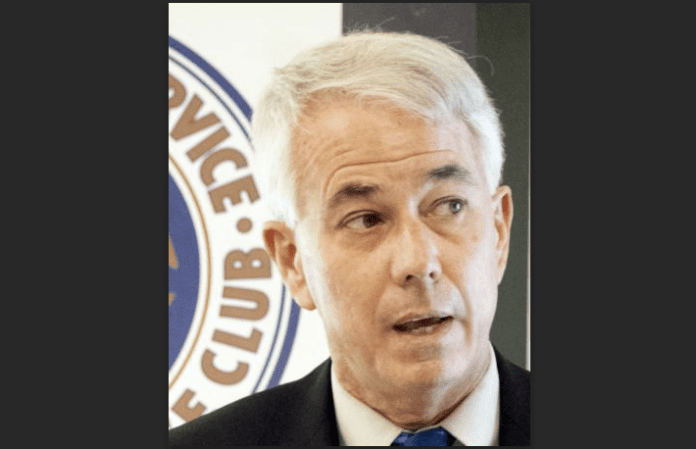Shelby County District Attorney General Steve Mulroy, who began his tenure Sept. 1, promoted his own brand of “restorative justice” in his “100-Day Address” Wednesday (Dec. 21) afternoon.
Supporters, staff, and members of the legal community gathered in the lobby of Vasco A. Smith Jr. County Administration Building to hear Mulroy’s observations of what has transpired since taking on the role of Shelby County’s law enforcement official.
“The clear and distinct changes in policy and philosophy from the prior administration have been calculated and intentional,” Mulroy said in a phone interview, prior to his public speech. “What the former DA called a “tough on crime” approach was to lock up as many as you can, for as long as possible. The continuous rise in violent crime was proof that approach was not working.”
Mulroy touted two of his initial changes as setting the tone of his administration − the establishment of an independent Justice Review Unit and diversifying his staff.
“My predecessor Amy Weirich refused to do so, but I created the Justice Review Unit to look at cases, where convictions may have been unfair or otherwise wrongful,” said Mulroy. “The system is not perfect, but mechanisms to make it more just for everyone is the right thing to do.”
Mulroy continued, “I believe that whenever possible, those who serve in Shelby County at some capacity ought to reflect the population they serve. That was not the case in the District Attorney’s office, and I wanted to change that dynamic.”
Mulroy said he has hired “dozens of new prosecutors and support staff” who share his vision of reform.
And true to his campaign pledge, the District Attorney General’s staff is more diverse than it has ever been. The number of persons of color among new hires is “roughly twice that of the pre-existing staff. Also, the number of minority supervisors has doubled, according to Mulroy.
“To prevent crime in this community and earn trust in the community, we must look like the community,” Mulroy said.
In his address, Mulroy did not shy away from talking about crime and “the Black community” over the past decade.
“…As crime rose, public confidence in the fairness of our justice system fell, particularly in the Black community, as our Crime Commission’s polling data shows,” Mulroy said. “This is not a coincidence. When the community lacks faith in the fairness of our system, it is less willing to cooperate with that system by providing tips, reporting crimes, and serving as witnesses, which only compounds our crime problem and makes it harder for us to help victims.”
Mulroy said the criminal justice system is “a faith-based system.” He harkened back to a campaign promise he repeatedly made “to restore that faith.”
He also pointed out what he described as the realities of a failed system of justice by the prior administration. “…We sent children to adult prisons, where they learned to become hardened criminals later in life. We sent adult offenders to prison with little to no counseling, education, job training, or re-entry support, and then, claimed surprise when they predictably resumed their former criminal lives.”
Mulroy said that a new Cold Case Unit has been created in partnership with the Memphis Police Department.
“We know that a small percentage of repeat violent offenders are responsible for a large percentage of violent crimes,” said Mulroy. “By working with law enforcement to resolve these cold cases, and by holding accountable these dangerous few, we can not only bring solace to the victims and their families…but also prevent them from doing further harm down the road.”
Mulroy said he has given prosecutors some autonomy and discretion needed to settle cases, clear backlogs, and double down on repeat violent offenders.
“That means spending more time on non-fatal shootings, an area where too many offenders have been escaping accountability, and less time on marijuana prosecutions, which only wastes taxpayer dollars, ruins lives, facilitates racially disproportionate enforcement and does nothing to make us safer,” Mulroy stated.
The citizens of Shelby County can look for more aspects of restorative justice practices because of their impressive success rates in reducing recidivism across the country.
Restorative Justice is generally described as an approach to justice where one of the responses to a crime is to organize a meeting between the victim and the offender, sometimes with representatives of the wider community. The goal is for the perpetrator and victim to share their experience of what happened, to discuss who was harmed by the crime and how, and to create a consensus for what the offender can do to repair the harm from the offense.
Mulroy cites Nashville as one of the cities enjoying lowered rates of repeat offending.
“We will expand the use of diversion and treatment courts,” said Mulroy. “Even the most traditional ‘law and order’ folks acknowledge the good that Veterans’ Court, Drug Court, and Mental Health Court have done. The people in these courts, including the judges, have advocated for expanding their use. I intend to help them with that.”
Additional areas of advocacy Mulroy pledged to pursue are:
- Animal cruelty.
- Worker exploitation – wage theft and job misclassification by employers in a “reinvigorated” Economic Crimes Unit.
Mulroy invoked his faith as a major inspiration in leading his administration.
“Throughout my campaign and my first 100 days, I’ve reflected on a favorite Bible verse,” Mulroy said. “Jesus said, ‘Blessed are they who hunger and thirst for justice, for they shall have their fill.’ From Christ, this is both reassurance and command. We can achieve justice, but we must hunger, thirst, and strive for it.
“I pledge to you that in the next 100 days, and the thousands after that, I will do precisely that.”



